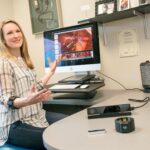
UMBC’s Helena Mentis, assistant professor of information systems, has received the distinguished CAREER Award from the National Science Foundation (NSF) to advance her research on surgical telemedicine. Beginning in June 2016, the $518,121, five-year award will enable her to examine the benefits of collaborative image interaction through gesture-based tools for remote surgeons to share expert knowledge in the operating room.
Mentis’ work focuses on “touchless interaction” interfaces and how physicians, specifically surgeons, can utilize technologies while remaining sterile during surgery. The technologies that she uses in her lab are commercially available, she explains, and surgeons can wear the devices under their scrubs. Mentis began her research with the Xbox Kinect and eventually began working with the Leap Motion. Most recently she has worked with the Myo armband and Google Glass.
Karl V. Steiner, vice president for research, shares, “We congratulate Dr. Mentis on her NSF CAREER Award, a highly-deserved recognition of her innovation and growing national reputation as a researcher and scholar of human-computer interaction and health informatics.”
The CAREER Program is one of NSF’s most prestigious awards, created to support “junior faculty who exemplify the role of teacher-scholar through outstanding research, excellent education and the integration of education and research within the context of the mission of their organizations.” The funding will support Mentis’ project, “Collaborative Image Manipulation and Annotation in Surgical Telemedicine.”
Mentis will advance understanding of which tools and best practices can most effectively facilitate telemedicine, teleconsulting (consulting between surgeons with similar expertise and experience), and telementoring (interaction between two professionals, one of whom has more experience and expertise than the other). In addition, she will determine the verbal and nonverbal mechanisms that medical professionals can use to share knowledge and images quickly, while avoiding contamination in the operating room.
“The NSF CAREER Award will allow me to take my work to the next level,” says Mentis. She explains that although telemedicine is a popular topic in discussions about the future of medicine, and many promising technologies are now available, “there are no clear directions yet about the best ways to do telemedicine.”
Mentis utilizes a surgical training space at Anne Arundel Medical Center in Annapolis, Maryland, to test gestural interface functionality before bringing technologies to surgeons in operating rooms. She predicts that over the course of the grant she will continue to incorporate new emerging technologies into her research.
In addition to having clear benefits for medical practitioners and patients, Mentis’s work also provides research opportunities for graduate, undergraduate, and high school students. Bringing students into the training room early on, to work closely with these new technologies, gives them a more direct connection with engineering careers and encourages them to stay in STEM fields, she explains.
“It’s not just about data systems or solving computational problems,” says Mentis. “We get to show and explain what the students can do with a degree.”
UMBC faculty have received 29 NSF CAREER awards in the last two decades. Most recently Christopher Hennigan, assistant professor of chemical, biochemical and environmental engineering, received a CAREER award of over half a million dollars to further his atmospheric particle research. Gymama Slaughter, assistant professor of computer science and electrical engineering, received a CAREER award in December 2013 for to develop a self-powered implantable glucose monitor, research she recently presented at TEDxBaltimore.
Image: Helena Mentis demonstrating a few of the gesture-based tools that she uses in her work. Photos by Marlayna Demond ’11 for UMBC.






